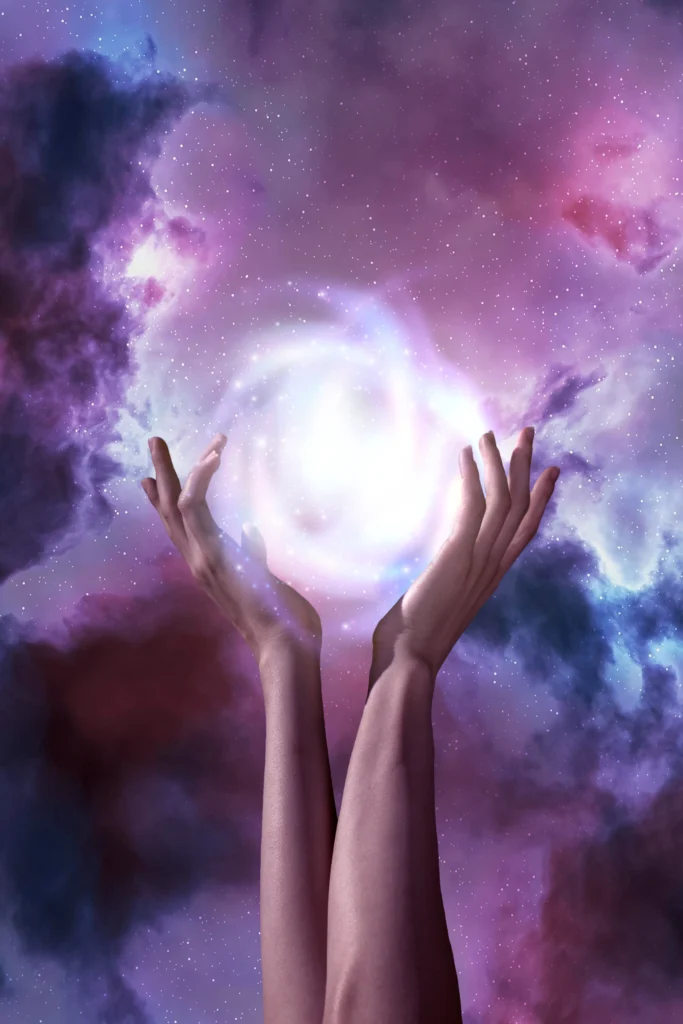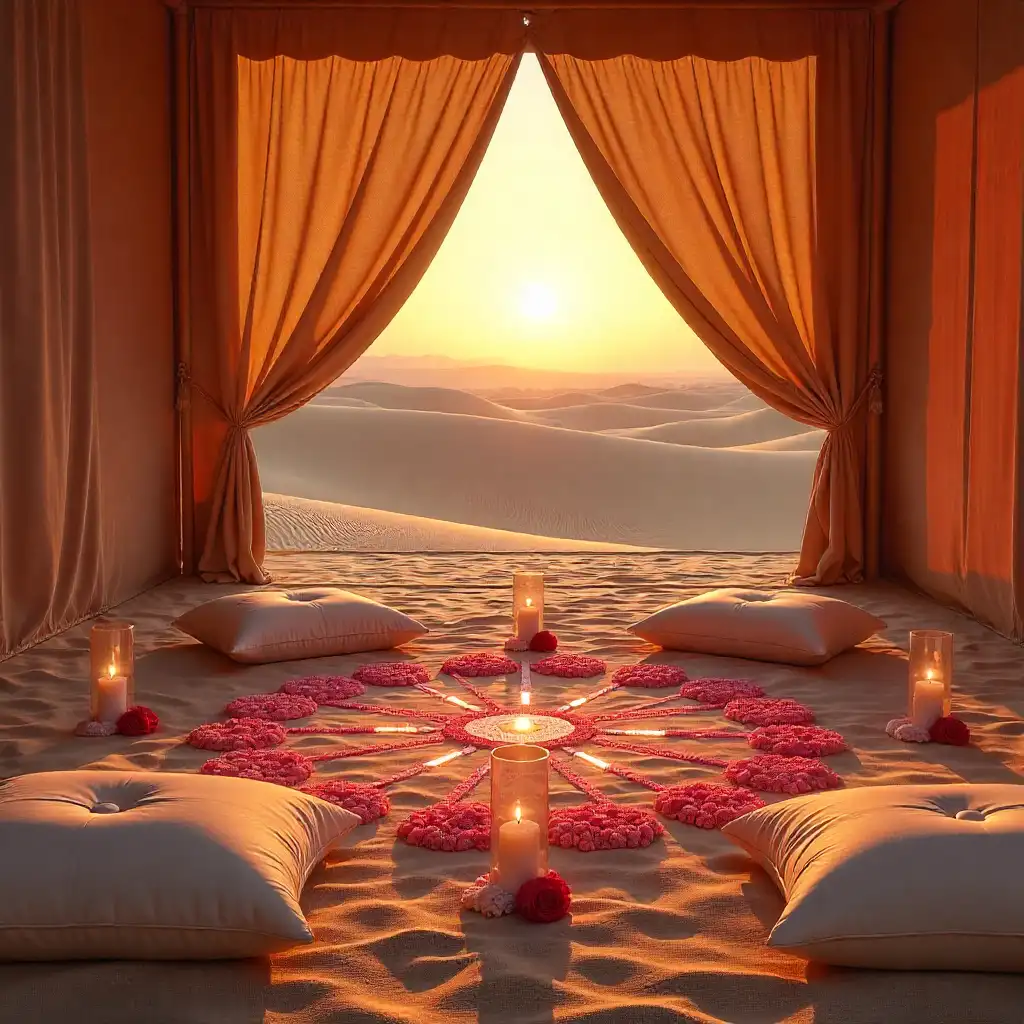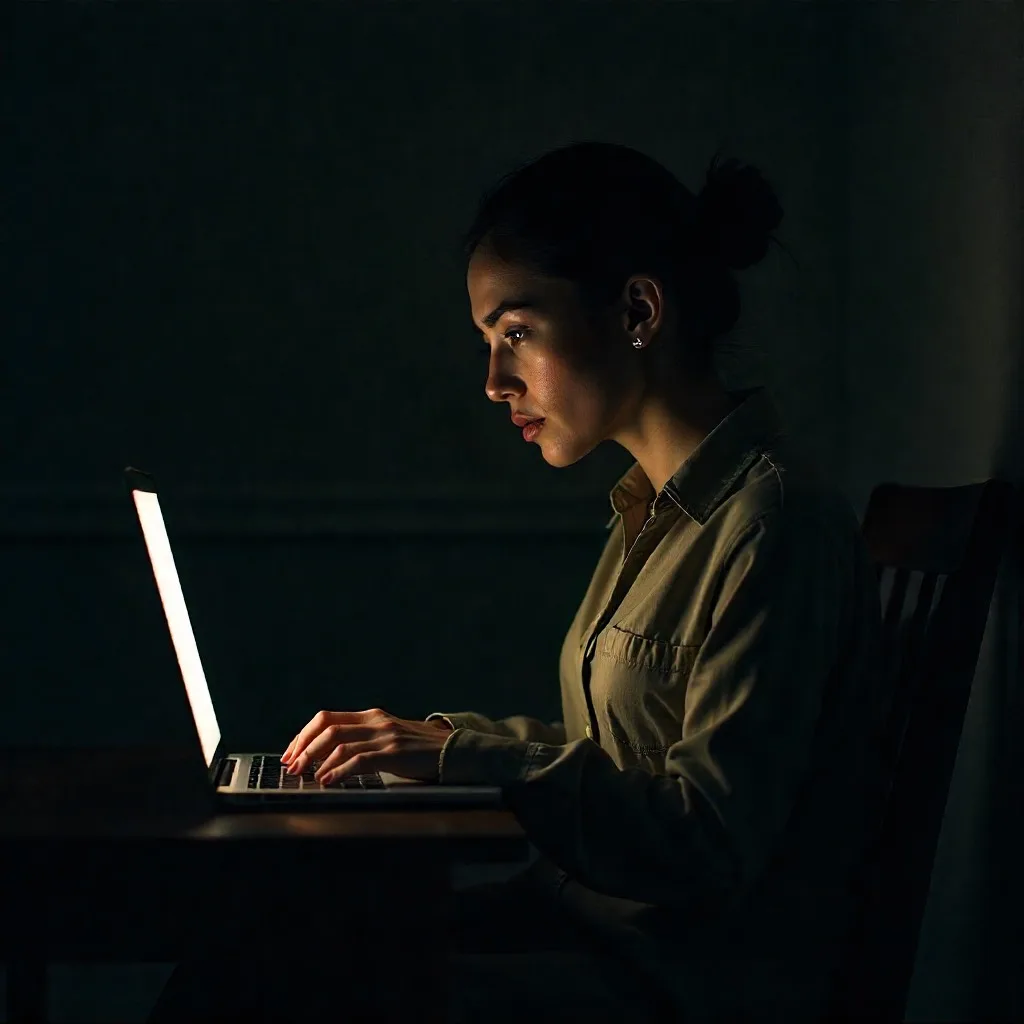We Don't Believe in Fate Anymore
and That Changes Everything
When did we stop surrendering to destiny and start trying to design it? And what have we lost or gained in the process?
By Ami Jain

My grandmother believed in fate with a certainty I’ve never felt about anything. When good things happened, it was God’s plan. When bad things happened, it was God’s plan. When my parents met, when her husband died, when I was born—all written in the stars, predetermined before time began. There was comfort in that worldview, I think. A kind of peace that comes from surrendering control.
I don’t have that peace.
I have vision boards. I have manifestation journals. I have a Notes app full of affirmations I recite while making coffee, trying to reprogram my subconscious to “align with abundance.” When something goes wrong, I don’t think “It wasn’t meant to be.” I think, “What did I do to block this? What limiting belief sabotaged my manifestation?”
Somewhere between her generation and mine, something fundamental shifted. Fate was once the architect of human life—the great invisible force that explained why kings rose and empires fell, why lovers met across crowded rooms, and why tragedies struck without warning. People surrendered to it because to resist fate was to resist God, the cosmos, destiny itself.
But today, in an age of manifestation, quantum realities, and subconscious reprogramming, a radical transformation has occurred: We no longer wait for fate to find us. We believe we can create what we desire.
And with that single cultural shift, the entire human story is being rewritten.
When Destiny Became Optional
For centuries, the narrative was simple: Your life is written in the stars. Astrology charts determined your nature, arranged marriages aligned with planetary movements, and fortunes were foretold in coffee cups and constellations. In the UAE and across the Arab world, fate—al-qadar was understood as divine decree, something to be surrendered to with grace and faith.
“In Islamic tradition, qadar is one of the six pillars of faith,” explains Dr. Hassan Al-Tamimi, an Islamic studies scholar at Zayed University. “It means accepting that everything happens according to Allah’s will and knowledge. This doesn’t mean fatalism or passivity, but it does mean recognizing limits to human control. There’s comfort in that—knowing that ultimately, you’re held by something greater than yourself.”
But the modern mystic—and I use that term loosely—no longer just bows to destiny. She curates it. She sets intentions under the new moon. She scripts her desires in gold-embossed journals titled “Manifest Your Dream Life.” She speaks affirmations into bathroom mirrors, not prayers into sacred spaces. She is not waiting for divine will. She is calling her future into form.

We have shifted from What will happen to me? to What will I make happen?
Layla, 31, who grew up in a traditional Emirati family but now attends weekly manifestation workshops, embodies this transition. “My mother says ‘Inshallah’ and means it—God willing, whatever He wills. When I say it now, I’m not sure what I mean. I still say it out of habit and respect, but in my mind, I’m already visualizing the outcome I want, trying to energetically pull it toward me. It feels like I’m honoring tradition while also… not quite believing it anymore.”
The Gospel of Self-Creation
Manifestation culture has not just introduced new spiritual practices. It has fundamentally restructured our relationship with reality.
Destiny says: It was meant to be. Manifestation says: You made it be.
Destiny says: This is your path. Manifestation says: You choose your timeline.
Destiny says: Accept what comes. Manifestation says: Demand what you deserve.
Even astrology, that ancient system of fate-reading, has evolved. It is no longer primarily predictive—it’s become a tool for energetic optimization. Modern horoscopes don’t tell you what will happen; they tell you how to get what you want to happen. Your birth chart isn’t fate; it’s your user manual for reality-hacking.
Sana, 22, a psychology student, is deep in manifestation culture. “I’ve manifested my university acceptance, my apartment, even specific experiences. I genuinely believe I’m creating my reality. When I read about the law of attraction or quantum physics—even if I don’t fully understand it—it makes sense to me in a way that ‘God’s plan’ never quite did. I want agency. I want to feel like I’m the author of my life, not a character in someone else’s story.”
This is the new spiritual paradigm: radical self-determination. You are not subject to fate. You are the source of it. Your thoughts create your reality. Your energy determines your experience. Your vibration attracts your circumstances.
It’s empowering. It’s also exhausting.
The Hidden Cost of Control
On the surface, this shift seems liberating. If fate isn’t fixed, then anything is possible. If destiny isn’t assigned by cosmic forces beyond your control, then the universe becomes a mirror of your effort, intention, and self-worth.
But this modern spirituality carries an emotional cost that we don’t talk about enough:
If everything is self-created, then every failure is self-inflicted.

Dr. Noor Siddiqui, a psychologist who practices in Dubai and has worked extensively with young professionals experiencing burnout and anxiety, sees this burden constantly. “Manifestation culture has created what I call ‘spiritual blame.’ Clients come to me devastated not just because something didn’t work out, but because they believe they caused it not to work out through insufficient belief or blocked energy. The psychological toll is enormous.”
Did your manifestation not arrive? You must not be “aligned.” Did your relationship not work out? Your vibration must be off. Did the opportunity pass you by? You didn’t call it in hard enough. Are you struggling financially? Your scarcity mindset sabotaged your abundance.
Where fate once gave us comfort—This was meant to happen, and I can find meaning in it—manifestation often gives us guilt, I must have blocked this, I failed spiritually.
We killed destiny and inherited full responsibility for everything that happens to us. And that responsibility is crushing.
Fatima, 24, describes hitting this wall hard. “I was deep into manifestation for two years. I had routines, rituals, and expensive courses. When things went well, I felt powerful—like I’d proven I could create reality. But when things went badly, I spiraled. I blamed myself for everything. My mental health deteriorated because I couldn’t reconcile bad outcomes with the belief that I create my reality. If I create it, and it’s bad, then I’m failing at the most fundamental level.”
The Paradox We’re Living
Here’s what’s fascinating: we are a generation that intellectually rejects predetermined fate while emotionally craving it.
We don’t believe in destiny anymore. We believe in energy, timelines, parallel realities, subconscious reprogramming, quantum fields. We speak of “co-creating with the universe,” which sounds empowered and collaborative. Yet deep inside, we still want the magic of serendipity—the feeling that some things aren’t planned, they are divinely meant.
We may have intellectualized fate out of existence, but emotionally, we haven’t let it go.
We still whisper, “If it’s meant for me, it will find me.” Even as we make vision boards, record affirmations, and attend workshops on energetic alignment to make sure it does.
This contradiction lives in almost every conversation I have with people my age. We say we don’t believe in fate, then describe meeting someone as “meant to be.” We claim we create our reality, then feel relief when something doesn’t work out, saying “I guess it wasn’t supposed to happen.” We’ve rejected the old framework but haven’t fully committed to the new one.
Rashed, 26, who works in tech, describes this tension perfectly: “Logically, I think manifestation makes sense. Thoughts influence behavior, behavior influences outcomes. But when my grandmother says something was ‘written,’ part of me still feels that. It’s comforting to think some things are beyond my control, that I’m not responsible for orchestrating every single outcome. But admitting that feels like… giving up? Like I’m not trying hard enough to shape my life.”
Dubai: Where Destiny Meets Design
There is perhaps no place in the world that represents this tension more vividly than the UAE, especially Dubai.
This is a city born not from historical inevitability but from conscious creation. Dubai didn’t arrive through fate—it was manifested from sand into skyline through sheer will, vision, and relentless execution. If any place embodies the philosophy that you create your reality, it’s here.
And yet, in its spiritual heart, fate still lives. Conversations include “Inshallah” (God willing) even as skyscrapers rise at the speed of imagination. Business deals close with prayers for divine blessing. Success is attributed to both hard work and God’s will, without anyone seeing contradiction in that combination.
You can visit the Grand Mosque at sunrise for Fajr prayer, surrender to divine will, and by sunset attend a manifestation masterclass teaching you how to quantum leap into your desired reality. This isn’t hypocrisy. It’s the new spiritual reality: we are not abandoning fate. We are negotiating with it.
Dr. Al-Tamimi sees this as a potential evolution, not necessarily a betrayal of tradition. “Islam has always emphasized both divine decree and human agency. Tawakkul—reliance on God—is meant to coexist with effort. The Prophet said ‘Tie your camel, then trust in God.’ So this idea that you work toward something while also surrendering the outcome? That’s not new. What’s new is the language and the emphasis. Modern manifestation puts 90% emphasis on the human effort and 10% on divine will. Traditional faith was closer to 50-50.”
Where that balance should sit is the question every spiritual seeker in the modern world is trying to answer.

Did We Kill Fate, or Finally Understand It?
Here’s a thought that keeps me up at night: What if destiny was never external?
What if fate was never a script handed down by unseen cosmic forces, but the energetic consequence of our deepest beliefs, our inherited patterns, our unconscious expectations?
What if everything our ancestors experienced as fate happening to them was actually fate responding to them—their collective consciousness, their cultural conditioning, their unexamined assumptions about how life works?
In that case, manifestation wouldn’t be the death of fate. It would be the revelation of its mechanism. We didn’t kill destiny. We decoded it. We pulled back the curtain and found that the wizard was us all along.
This is the most generous interpretation of manifestation culture: it’s not rejecting the spiritual truth that there are forces beyond us, but recognizing that we are participants in those forces, not just subjects of them.
Dr. Layla Merchant, a philosopher who teaches at the American University of Sharjah and studies changing conceptions of fate and free will, offers this framework: “Perhaps the shift isn’t from fate to no-fate, but from passive fate to active fate. The old model was: fate exists, and you accept it. The new model is: fate exists, and you co-author it. Both acknowledge something larger than the individual ego, but one emphasizes surrender and the other emphasizes participation.”
That would mean both my grandmother and I are right. She’s right that there are forces beyond our control. I’m right that our consciousness shapes our experience. The question is just where the line is—and whether that line is fixed or negotiable.
What We Gained and What We Lost
Let’s be honest about both sides.
What we gained by rejecting fixed fate:
We gained agency. The ability to imagine different futures and work toward them. The permission to question inherited paths and forge our own. The power to say “This isn’t working” and try something else rather than accepting suffering as divinely ordained.
We gained responsibility. The recognition that we shape our lives through choices, even if we don’t control all outcomes.
We gained hope. If nothing is predetermined, then change is always possible. Healing is possible. Transformation is possible.
What we lost:
We lost comfort. The deep, ancient comfort of believing that someone or something greater is holding the story, even when we can’t see the plot.
We lost community. Shared fate creates shared meaning. When everyone is manifesting their own individual reality, collective narratives weaken.
We lost grace. The ability to experience failure, loss, or disappointment without also experiencing shame for having “created” it through insufficient manifestation skills.
We lost surrender. The spiritual practice of letting go, trusting that we’re held, accepting that some things are beyond our comprehension or control.
Both are real. Both matter. And most of us are stuck somewhere in between, trying to hold both truths simultaneously.
The New Spiritual Frontier
We stand at a threshold. A generation that no longer prays to the universe like a distant deity, but with it like a co-creative partner. One that refuses to see life as a random accident, but refuses just as strongly to accept powerlessness.
The question is no longer Do you believe in destiny?
The question is: How do you define it?
Is destiny the path laid out for you by forces beyond your understanding—something to discover and accept?
Or is destiny the path you’re brave enough to call in, create, and claim—something to design and manifest?
Or—and this is where I keep landing—is it somehow both? A dance between effort and grace, between will and surrender, between the life you create and the life that creates you?
Maybe that’s the wisdom we’re moving toward. Not the rejection of fate, but its integration. Not the death of destiny, but its maturation into something more complex, more participatory, more humble about what we can control and what we can’t.
Because in the end, whether you believe in fate or manifestation or some synthesis of both, one truth remains:
Something is always listening.
Whether that something is God, the universe, quantum fields, or the depths of your own consciousness, your beliefs, your words, your energy shape your experience in ways we’re only beginning to understand.
So maybe the question isn’t whether fate exists.
Maybe the question is: What story are you telling? What are you calling in? What are you surrendering to?
And can you be humble enough to hold both the power and the mystery?
Because I think that’s where wisdom lives. Not in total control. Not in total surrender. But in the liminal space between, where we work like everything depends on us and trust like everything depends on something greater.
My grandmother had her truth. I’m finding mine. They look different, but maybe they’re pointing at the same thing.
We didn’t kill fate. We’re just learning to speak its language.
FATE ACROSS TRADITIONS
How Different Cultures Understand Destiny:
Islamic Tradition (Qadar): Divine decree and predestination as pillar of faith. Everything that happens is within Allah’s knowledge and will. Coexists with human free will and responsibility for choices. Balance between effort (ikhtiar) and trust (tawakkul).
Hindu/Vedic (Karma): Actions in past lives determine present circumstances. Fate as consequence of past deeds, but present actions shape future fate. Destiny is negotiable through right action, spiritual practice, and accumulated merit.
Ancient Greek (Moira): Even gods subject to fate. Three Fates (Moirai) spin, measure, and cut the thread of each life. Attempts to escape fate typically ensure it. Emphasis on accepting what cannot be changed.
Chinese (Ming): Destiny (ming) as both predetermined lot and life span. Can be influenced but not completely controlled. Emphasis on understanding your fate to live in harmony with it rather than fighting against it.
Modern Manifestation: Reality as malleable based on consciousness, energy, and belief. Minimal external fate; maximal human creative power. Everything is choice, attraction, or energetic alignment. Emphasis on individual as primary creator of experience.
The Synthesis: Growing number of spiritual seekers blending traditions—honoring divine will while also engaging conscious creation. “Co-creation with the universe” as middle path between total control and total surrender.
FINDING BALANCE
Questions to Ask Yourself:
If you lean toward manifestation:
- Am I taking responsibility for things genuinely outside my control?
- Am I blaming myself for outcomes influenced by systemic factors, privilege, or chance?
- Do I allow space for mystery, surprise, and things I didn’t plan?
- Can I accept disappointing outcomes without shame?
- Am I manifesting from fear of not being enough, or from genuine desire?
If you lean toward fate:
- Am I using “meant to be” to avoid taking action?
- Am I surrendering agency in situations where I actually have power?
- Do I excuse harmful situations as “God’s plan” rather than addressing them?
- Am I confusing acceptance with passivity?
- Does my belief in fate create peace or paralysis?
The Middle Path Might Look Like:
- Working hard toward goals while staying open to unexpected outcomes
- Setting intentions without rigid attachment to specific results
- Taking responsibility for choices without taking blame for everything
- Trusting in something greater while still showing up fully
- Asking “What is mine to do?” and “What is mine to release?”
- Honoring both effort and grace, will and surrender
Remember: Wisdom isn’t choosing one extreme. It’s holding both truths—that you shape your life AND that life shapes you—with humility and grace.



